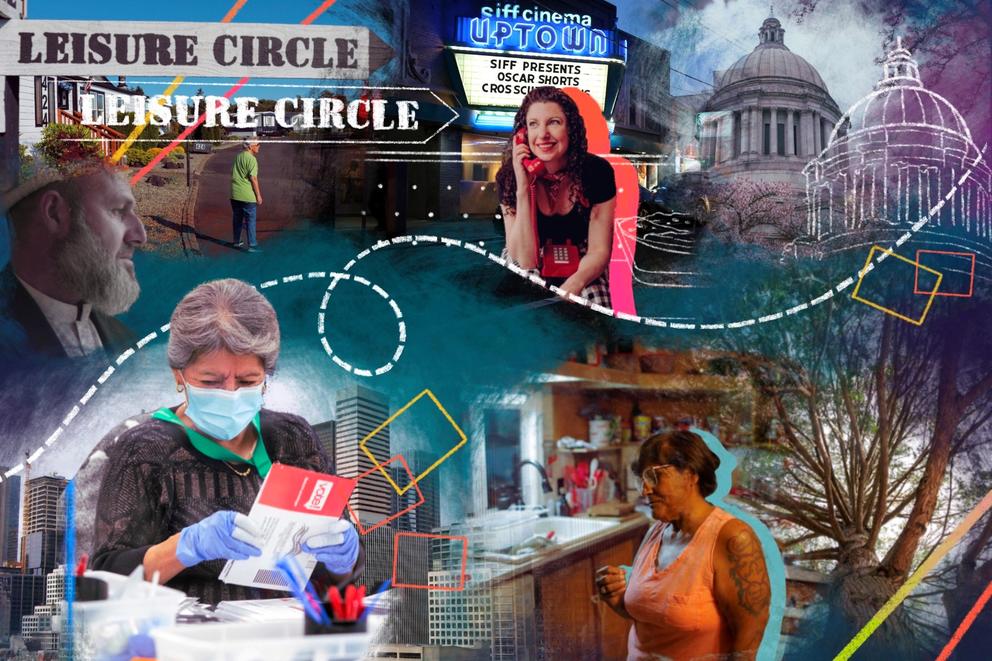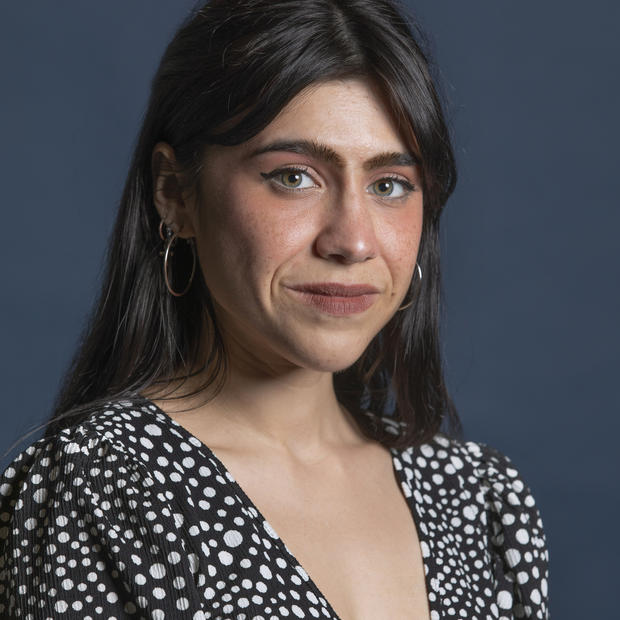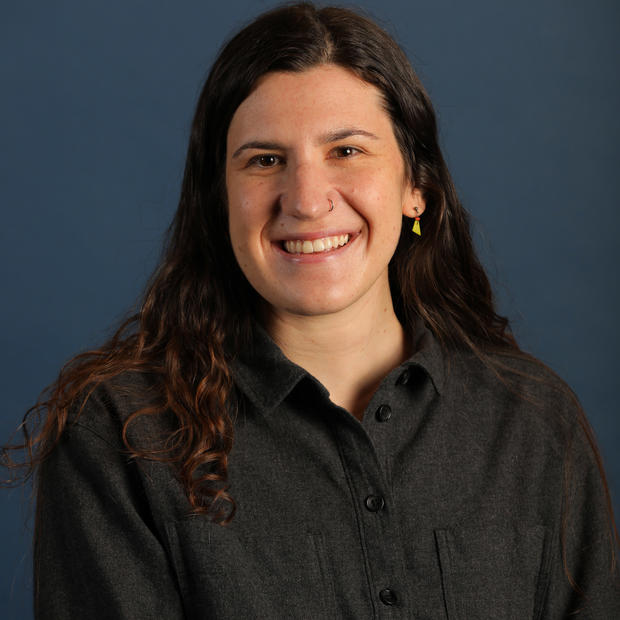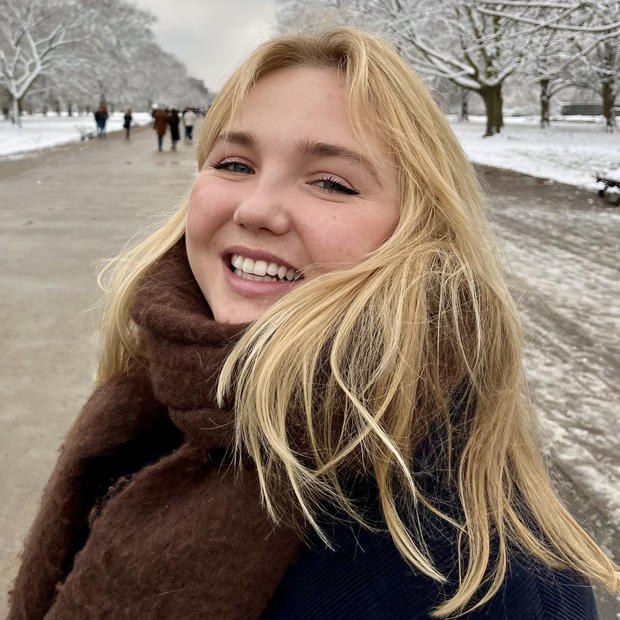In the past year, we broadened our original productions to welcome Rachel Belle’s food-forward Your Last Meal podcast and the video series Nick on the Rocks, formerly produced by Central Washington University. Titles like Crosscut Reports expanded to a weekly schedule, while the KCTS 9 broadcast segment Crosscut Now grew into a longer, 10-minute format on the Crosscut site.
In the newsroom, the politics team broadened its horizons to cover elections in other major cities, including Yakima, Spokane, Tacoma and Bellingham. The investigative team started the new WA Workplace Watch project, building on the momentum of last year’s WA Recovery Watch launch. And behind the scenes, we’ve prepared for changes to come in 2024.
This article is part of Crosscut's yearly Impact Report series. Find more on our work, including 2023 numbers, here.
Here are six of Crosscut’s most noteworthy projects from the year and a look at what’s in store for 2024.
1. Impactful journalism from the Pacific to the Palouse
From public policy to civic action, some of our coverage in 2023 influenced tangible change. A number of stories exemplified how journalism can go beyond the headlines.
Crosscut reporter Joe O'Sullivan of Crosscut and McClatchy reporter Shauna Sowersby continued their coverage on government officials’ use of legislative privilege to keep records from the public. This included nine stories in 2023 that featured public records obtained by Crosscut and McClatchy. Following the coverage, the Washington Legislature changed its policy on legislative privilege, moving to an “opt-in” policy to shield records rather than the “opt-out” method under which records were being blacked out without legislators’ agreement.
The reporting by O’Sullivan and Sowersby illuminated secretive government practices that resulted in a handful of lawsuits, one which led to a settlement against the Legislature and one by the Washington Coalition for Open Government and advocate Jamie Nixon for violating the Public Disclosure Act. But the practice isn’t new – a February story exposed how the Legislature has spent more than 15 years trying to consolidate its power to sidestep government transparency.
Reporters across the Crosscut newsroom focused on housing affordability and homelessness this past year. Central Washington reporter Mai Hoang dug into efforts to house people in Yakima and Spokane and took a look at housing affordability that shone a light on how much rental costs have increased statewide. Seattle city reporter Josh Cohen looked at changing housing policy, and in his deep dive on Downtown Seattle explored the question of whether empty office space could be converted into housing. Indigenous Affairs reporter Luna Reyna exposed housing issues in Indigenous communities in a series of stories, including a Samish housing project in Anacortes.
In August, reporters Farah Eltohamy and Hoang covered the movement of mobile home park residents across the state after management company Hurst & Son LLC acquired a string of parks during the pandemic, resulting in steep rent increases, threats of eviction and new alleged problems with upkeep and maintenance. The story was highlighted by officials in the Department of Commerce and Washington representatives and led to a series of follow-up reporting by other news outlets, including in Puyallup and Bremerton. Other mobile home communities have followed suit in organizing for tenants’ rights.
The January Out & Back episode featuring Indigenous runner and activist Rosalie Fish helped spur a domino effect in the community. Fish spoke with host Alison Mariella Désir about her efforts to spread awareness for Missing and Murdered Indigenous Women – an episode which caught the eye of Seattle’s pro hockey team. For each home game of the regular season, the Kraken donate $32,000 to a local nonprofit or community group. After viewing the episode, team officials were inspired to donate to Fish or, at her behest, to a local organization.
2. The launch of the Crosscut Origins docuseries
In February, Cascade Public Media launched a new docuseries project, Crosscut Origins, to foster greater collaboration with filmmaking communities in the Pacific Northwest and Canada. The impetus came after collaborating with filmmaker and reporter Thanh Tan on the premiere season, Crosscut Origins: Refuge After War. After witnessing the fall of Kabul in August 2021, Tan, who was raised by Vietnamese refugees, felt compelled to help Afghan refugees who would be undergoing similar upheaval and acculturation.
“When I was asked to consider directing a docuseries about the resettlement of Afghan refugees in Washington, I thought of the power of film to help us understand this moment in time and the opportunity to learn from the Vietnamese refugee experience,” Tan wrote of the premiere episode.
The documentary spurred a desire to fund more docuseries made by filmmakers covering communities they themselves are a part of, giving way to the Crosscut Origins franchise. Every February, Crosscut will open submissions for documentary filmmakers to apply for $40,000 to fund a five-part docuseries, with the requirement that the filmmaker be part of the community they are documenting (i.e., Indigenous stories told by Indigenous filmmakers).
Following a sold-out premiere event for Refuge After War at SIFF Uptown, the call for submission for Season 2 was announced. Applicants were reviewed by a committee from Cascade Public Media, the Seattle International Film Festival and Pacific Northwest film community leaders. Announced in May 2023 at the SIFF opening ceremony, the winner of Season 2, self-proclaimed “budding filmmaker” Lady Scribe, will focus her docuseries on her vibrant Black community and how through heartbreak and hardships, the community has found triumphs through the arts.
Submissions for Season 3 will open in early 2024 following Season 2’s premiere event. Find more information on Crosscut Origins here.
3. New and expanded multimedia series
Crosscut took leaps expanding its multimedia approach in 2023, adding new recurring video and podcast productions while expanding our existing programming. The weekly broadcast segment Crosscut Now shifted to a 10-minute format, bringing on new anchor Paris Jackson to lead extended analysis of current events through interviews with expert guests.
The video adventure series Nick on the Rocks came under Cascade Public Media’s production umbrella after four seasons produced by Central Washington University. The fifth season aired this month, following host Nick Zentner, a senior geology lecturer at CWU, across Pacific Northwest landscapes while unearthing the history behind them.
Podcasts were a major focus this year. Crosscut Reports increased to a weekly publishing schedule, continuing its in-depth explorations of issues impacting Washingtonians. The show welcomed new co-host Maleeha Syed to join senior podcast producer and co-host Sara Bernard. The James Beard Award finalist podcast Your Last Meal also joined Crosscut's podcast cohort, hosted by award-winning journalist Rachel Belle. Each episode features interviews with chefs, farmers, food industry personalities and artists about their ideal final meal.
Additionally, Crosscut forged a relationship this year with Northwest Public Broadcasting, which picked up episodes of Mossback’s Northwest to air on PBS stations in Eastern Washington, expanding the show’s regional viewership. Friends of Magnuson Park, who are celebrating 100 years of flight, are showcasing the Mossback Northwest: “The First Around-the-World Flight” episode — focused on the first nonstop aerial circumnavigation of the globe, which commenced at the park. The episode will appear throughout 2024 in NWPB’s centennial events and programming.
4. Washington Workplace Watch
Jobs and worksites have changed drastically in the wake of the pandemic. This March, the Crosscut investigative desk launched Washington Workplace Watch for long-term coverage of working conditions, safety concerns and government oversight efforts throughout the state.
Reporter Lizz Giordano examined the search for accountability following workplace fatalities. She recently wrote about how a 36-year-old new father who died working at a Seattle construction site was a landmark case in holding employers criminally liable. Still, officials struggle to enforce repeat safety violations.
Giordano also followed the fight for unionized Starbucks workers to solidify a contract with the company. Her reporting on prolonged negotiations and mounting complaints show the struggles of a new labor movement.
In the Check Your Work guide, readers can find public tools for searching company safety records, wage violations and labor practice complaints.
Workplace Watch also covered heat protection for outdoor workers, hospital staff shortages and other stories affecting working conditions and employer violations. Read an impact report specific to our investigative coverage here.
5. Readers were behind the wheel of our expanded political coverage
We took a big step toward becoming a statewide news organization this election season by expanding our campaign coverage to four new cities: Bellingham, Yakima, Tacoma and Spokane.
Although it was an odd election year, a lot was at stake in local races. We practiced the Citizens Agenda method by asking readers what they would like to know about their candidates and using those questions to inform our voter guide interviews.
We included races from each city in our voter guide and followed ballot initiatives like Bellingham’s minimum wage bump and Tacoma’s rental protections proposal. Stories on the Tacoma initiative and the heated Spokane mayoral race were among our most-read articles in October.
We also continued our close coverage of Seattle elections. Seattle city reporter Josh Cohen spoke to every City Council candidate in the general election race to write in-depth profiles of each district. Cohen also reported on how business and real estate interest groups spent over $1 million to support centrist campaigns.
In our Crosscut/Elway poll, voters outlined their legislative priorities in January, discussed wavering support for the Supreme Court in April, voiced hopes and concerns for Seattle City Council after the August primary and showed increased political polarization in November.
State politics reporter Joseph O’Sullivan followed hundreds of bills as they moved through the Legislature last winter. O’Sullivan reported in June on the lobbying association that shaped bills in Olympia. He also tracked Washington’s new capital gains tax through the courts and held lawmakers accountable for their use of so-called “legislative privilege” to keep public documents redacted from public view.
Throughout the Legislative session, our bill tracker helped readers keep tabs on which proposals related to gun control, drug reforms, the environment and housing were still alive. We’ll be keeping a close eye on the 2024 session as it kicks off on Jan. 8. Follow along with our Politics newsletter, which will land in your inbox year-round.
6. And some fun:
The year also included a few offbeat highlights, like Crosscut’s cameo on The Late Show with Stephen Colbert for coverage of Gov. Inslee’s purchase of an abortion pill stockpile. Does anyone know if the show about Gov. Inslee is in the works?
Crosscut also made a few friends across the pond – for, of all things, our coverage of prison reform projects. In February, Crosscut reported on Stafford Creek Correction Center’s pilot project to reshape how people are treated inside prisons. The program is based on Norway’s experience in creating more humane conditions for inmates and staff and helping ease their transition once they return to society. Correctional officers were able to visit prison conditions in Norway, where, unlike in the United States, almost all incarcerated people are ultimately released.
In November, Crosscut also reported on Washington’s Residential Parenting Program, which allows pregnant women coming through the legal system to stay with their babies and get parenting support. The story caught the eye of a popular Swedish newspaper which hopes to do similar reporting on the program, according to Crosscut sources. And reporter Brandon Block was invited on the Bulgarian National Radio station to discuss his May story on U.S. pandemic relief funding fraud. His interview can be heard here – though it’s all in Bulgarian.
Other fun features include a deep dive into the rising auction prices of Alden Mason’s art and the unexpected discovery of potential forgeries from a Spanish storefront, reminiscent of a Bukowski story. One cyclist biked every street in Seattle, and a Seattle photographer shared his family’s history with J. Robert Oppenheimer and the Manhattan Project. Season 2 of Made There, which highlighted small businesses in Yakima County, was also the subject of a Yakima Herald-Republic feature, celebrating the area’s artisans and creators.
7. Changes to come in the year ahead
2024 is already shaping up to be a pivotal year with a charged presidential election, hot statewide races and new landscapes on our end. At the start of the new year, Crosscut and its parent company Cascade Public Media will be moving to 316 Broadway on First Hill, previously occupied by Childhaven. The four-story building includes a new large gathering room for community events, including opportunities to meet and greet the newsroom staff.
Cascade Public Media is also undergoing a transition apart from the moving boxes. The company will continue to provide impactful journalism and original programming under a new name: Cascade PBS. Nearly 70 years of KCTS 9’s award-winning local television will merge with the deeply reported journalism of Crosscut under one of the most trusted names in media. The Cascade PBS name reflects two important things: the regional community we serve and the quality PBS programming and news you rely on. What won’t change is our coverage. We’ll keep delivering high-quality public television and the newsroom will continue its investigative journalism and news reporting with the same care and skill as always.
Get more Crosscut in your inbox
Sign up for our Daily newsletter for the most important headlines of the day or sign up for our Weekly newsletter for the best stories of the week. Or, select both for more Crosscut.







